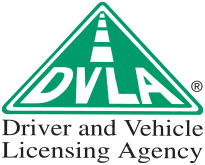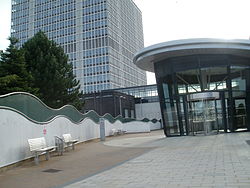- Driver and Vehicle Licensing Agency
-
Driver and Vehicle Licensing Agency 
overview Jurisdiction United Kingdom Minister responsible Mike Penning MP, Parliamentary Under-Secretary of State executive Simon Tse, Chief Executive, Driver and Vehicle Licensing Agency Parent Department for Transport Website dft.gov.uk/dvla The Driver and Vehicle Licensing Agency (DVLA; Welsh: Asiantaeth Trwyddedu Gyrwyr a Cherbydau) is the organisation of the UK Government responsible for maintaining a database of drivers and a database of vehicles in Great Britain; its counterpart in Northern Ireland is the Driver & Vehicle Agency (DVA). The agency issues driving licences, organises collection of vehicle excise duty (also known as road tax and road fund licence) and sells private number plates.
The DVLA is an executive agency of the Department for Transport; the responsibility of which rests with one of the department's ministerial team - the current minister responsible being Mike Penning, MP. The current acting Chief Executive of the agency is Simon Tse, replacing Noel Shanahan who was appointed in 2007[1] and moved to the DfT in May 2010.
The DVLA is based in Swansea, south Wales, with a prominent 16 storey building in Clase and offices in Swansea Vale. It was previously known as the Driver and Vehicle Licensing Centre (DVLC). The agency also has a network of offices around Great Britain, known as the Local Office Network.
DVLA introduced Electronic Vehicle Licensing (EVL) in 2004[2] with customers now being able to pay vehicle excise duty online and by phone. However, customers still have the option to tax their vehicles via the Post Office.
The DVLA is also incorrectly assumed to endorse driving licences with penalty points, the DVLA has no legal power to convict a motorist of a driving offence, if the licence is surrendered to the police for an endorsable offence the licence is sent to the magistrates court in the county the offence was committed in, endorsed and returned to the driver, DVLA's database is updated electronically by the magistrates court and will only request the licence if the driver has failed to produce it to the magistrates, either through the police, a fixed penalty ticket or summons.
Contents
DVLA database
The vehicle register held by DVLA is used in many ways. For example, by the DVLA itself to identify untaxed vehicles, and by outside agencies to identify keepers of cars entering central London who have not paid the congestion charge, or who exceed speed limits on a road that has speed cameras by matching the cars to their keepers utilising the DVLA database. The current DVLA vehicle register was built by EDS under a £5 million contract signed in 1996, with a planned implementation date on October 1998, though actual implementation was delayed by a year. It uses a client–server architecture and uses the vehicle identification number, rather than the registration plate, as the primary key to track vehicles, eliminating the possibility of having multiple registrations for a single vehicle.
The Vehicle Identity Check (VIC) was introduced to help reduce vehicle crime. It is intended to deter criminals from disguising stolen cars with the identity of written off or scrapped vehicles.
When an insurance company writes off a car, the registration document (V5 logbook) is surrendered to them and destroyed. The insurance company will then notify the Driver and Vehicle Licensing Agency (DVLA) that the vehicle has been written off. This notification will set a 'VIC marker' on the vehicle record on the DVLA database.
DVLA database records are used by commercial vehicle check companies to offer a comprehensive individual car check to prospective purchasers.
However, the accuracy of the data held remains a continuing problem.[citation needed] Anyone can request information from the database if they have a reason to for a fee of £2.50.[3]
The database of drivers, developed in the late 1980s, holds details of some 42 million driver licence holders in the UK. It is used to produce drivers' licences and to assist bodies such as the Driving Standards Agency, police and courts in the enforcement of legislation concerning driving entitlements and road safety.
Wrong confidential records on surveys
In December 2007, it was revealed that while sending out surveys to 1,215 drivers, the DVLA sent out confidential details, but to the wrong owners. The error occurred during the sending out of routine surveys, and was not discovered until members of the public contacted the DVLA to notify them of the error.[4]
Financial information
Between 2002 and 2015 it is estimated that the DVLA will spend £500 million on information technology from IBM.[5]
Employment
Staff of the DVLA are predominantly female whereas other parts of the Department for Transport are predominantly male. Starting salaries are just over £12,500.[6] In November 2007, a Public Accounts Committee report criticised "amazingly high" levels of sick leave among staff at the DVLA, with employees having an average of three weeks a year sick leave. The report said that overall sickness leave at the DfT and its seven agencies averaged 10.4 working days per full time employee in 2005 - which they said cost the taxpayer £24m. While sick leave rates at the department itself and four of its agencies were below average - at the DVLA and DSA, which together employ more than 50% of all DfT staff - they were "significantly higher." Committee chairman Edward Leigh said it was surprising the agencies could "function adequately."[7] In 2008 DVLA staff went on a one day strike over pay inequality arguing that they should receive similar salaries to other employees of the Department for Transport.[6]
Advertising
The DVLA uses advertising to warn drivers that if they do not pay their road tax, their cars may be crushed.[8]
Problems at the DVLA
Missing log books
In 2006, 120-130,000 vehicle log books went missing. A BBC investigation in 2010 found that vehicles worth £13 million have been stolen using the log books in the 18 months preceding the investigation. Around ten cars are found each week to have forged log books and police said it would be decades before they were all recovered.[9]
DVLA letter bombs
Main article: 2007 United Kingdom letter bombsOn 7 February 2007, a letter bomb was sent to the DVLA in Swansea and injured four people. It is suspected that this is part of a group of letter bombs sent to other organisations that deal with the administration of motoring charges and offences, such as Capita in central London, which was targeted a few days earlier. Miles Cooper, aged 27, a school caretaker, was arrested on 19 February 2007, and charged on 22 February. The DVLA have since installed X-Ray machines in all post opening areas to reduce the effectiveness of any further attacks.
Lost entitlements
In 2009 BBC Watchdog reported that entitlements, specifically the entitlement to drive a motor-cycle, were being lost from reissued driving licences.[10]
References in popular culture
The DVLA in Swansea is regularly referred to in the British political Sitcom Yes, Minister. Bernard Woolley is regularly threatened with re-assignment there. In the episode Big Brother, Jim Hacker is scheduled to give an address there.
References
- ^ "Appointment of next DVLA chief executive". http://www.gov-news.org. Government News. 2007-18-07. http://www.gov-news.org/gov/uk/news/appointment_of_next_dvla_chief_executive/35804.html. Retrieved 2011-11-02.
- ^ "Freedom of Information Request relating to EVL". www.dft.gov.uk. Department for Transport. http://www.dft.gov.uk/dvla/foi/Disclosure/~/media/pdf/foi/FOI201006.ashx. Retrieved 2011-01-10.
- ^ Oates, John (20 January 2010). "DVLA makes £44m flogging drivers' details". The Register. http://www.theregister.co.uk/2010/01/20/dvla_data_flog/. Retrieved 4 February 2010.
- ^ "Drivers sent wrong DVLA details". BBC News. 2007-12-06. http://news.bbc.co.uk/1/hi/wales/7131506.stm. Retrieved 2007-11-07.
- ^ "DVLA doubles annual contract spending". Kable. 23 November 2009. http://www.kable.co.uk/dvla-ibm-renegotiation-23nov09. Retrieved 4 February 2010.
- ^ a b DVLA strike causes widespread disruption Public and Commercial Services Union 29 August 2008] archived
- ^ DVLA sick leave 'amazingly high' BBC News - 20 November 2007
- ^ http://www.heraldscotland.com/the-credit-crunch-that-ll-be-the-sound-of-crispy-fried-pets-1.831315
- ^ Kemp, Phil (31 January 2010). "Theft of DVLA log books fuels cars scam". BBC Radio 5 live. http://news.bbc.co.uk/1/hi/uk/8487381.stm. Retrieved 4 February 2010.
- ^ "DVLA Removing Licence Entitlements". BBC Watchdog. http://www.bbc.co.uk/blogs/watchdog/2009/04/dvla_removing_license_entitlem.html. Retrieved 4 June 2010.
External links
- http://www.dvla.gov.uk accessed 13 June 2006
- http://www.direct.gov.uk/motoring accessed 13 May 2006
News stories
- DVLA runs into IT trouble accessed 13 May 2006
- Database to nail rogue drivers accessed 13 May 2006
- DVLA sells your details to criminals accessed 13 May 2006
- DVLA still selling your details accessed 6 June 2009
Department for Transport of the United Kingdom 55 Victoria Street · Great Minster House · SouthsideMinisters Executive agencies Driver and Vehicle Licensing Agency · Driving Standards Agency · Government Car and Despatch Agency · Highways Agency · Maritime and Coastguard Agency · Vehicle and Operator Services Agency · Vehicle Certification AgencyNon-departmental public bodies British Transport Police Authority · Northern Lighthouse Board · Passenger Focus · Trinity House Lighthouse ServiceOther Categories:- Executive agencies of the United Kingdom government
- Trading funds of the United Kingdom government
- Motor vehicle registration agencies
- Organisations based in Swansea
- Road transport in the United Kingdom
- Department for Transport
Wikimedia Foundation. 2010.

